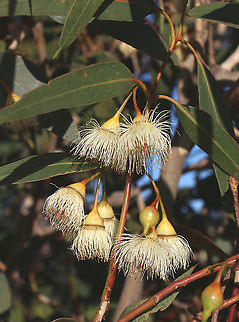
Appearance
''Eucalyptus melliodora'' is a tree that typically grows to a height of 30 m and forms a lignotuber.The bark is variable ranging from smooth with an irregular, short stocking, to covering most of the trunk, fibrous, dense or loosely held, grey, yellow or red-brown, occasionally very coarse, thick, dark brown to black.
The smooth bark above is shed from the upper limbs to leave a smooth, white or yellowish surface. Young plants and coppice regrowth have lance-shaped to elliptic leaves that are 25–65 mm long and 9–35 mm wide and petiolate.
Adult leaves are the same dull light green or slate grey on both surfaces, lance-shaped to egg-shaped, 60–140 mm long and 8–30 mm wide on a petiole 8–20 mm long. The vein on the leaf margin of both adult and juvenile leaves is markedly distant from the leaf margin.
The flower buds are arranged in groups of seven on an unbranched peduncle 3–10 mm long, the individual buds on pedicels 2–10 mm long. Mature buds are club-shaped, oval or diamond-shaped, 4–8 mm long and 3–5 mm wide with a conical to rounded operculum.
Flowering has been recorded in most months and the flowers are white. The fruit is a woody, hemispherical to shortened spherical capsule 3–8 mm long and 3–7 mm wide with the fruit near or below rim level.
Distribution
Yellow box is widely distributed on the eastern plains and tablelands from western Victoria, New South Wales and up from the capital territory to south-central Queensland.Habitat
Yellow box is widely distributed on the eastern plains and tablelands from western Victoria, New South Wales and up from the capital territory to south-central Queensland.Uses
''Eucalyptus melliodora'' is considered to be the best native tree for honey production. The honey produced has a delightful golden colour and an excellent taste. The timber is pale brown, dense and heavy , resistant to decay and has been used for sleepers, posts, poles and bridges. It is not known as a furniture timber.References:
Some text fragments are auto parsed from Wikipedia.